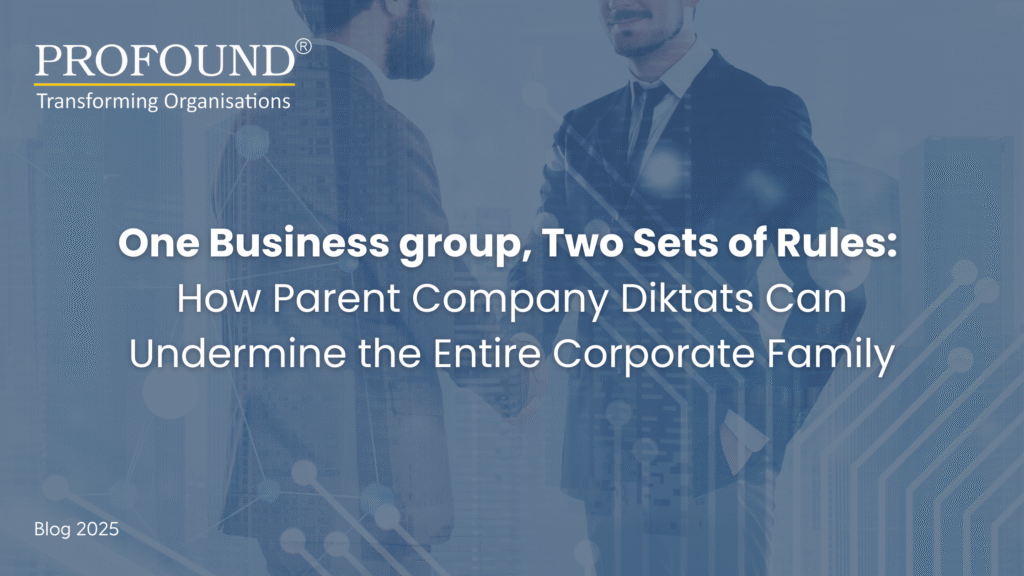
In the grand tapestry of corporate structures, the relationship between a parent company and its sister companies is often portrayed as a model of synergy. They share resources, benefit from a unified brand, and work together to conquer the market. It’s a beautiful picture of a happy, functional business group.
But what happens when the parent company starts playing favourites—with itself?
This is the reality in many large organizations. An unspoken, yet iron-clad rule exists: The parent company always comes first. This isn’t a suggestion; it’s a diktat. When resources are scarce, a delivery truck is waiting, or a critical team is needed, the parent company’s needs supersede all others.
While this might seem like a logical way to protect the flagship brand, this “parent company first” policy is a slow-acting poison that can cripple sister companies and, ultimately, weaken the entire corporate structure.
I am sharing a few vital pointers on what I practice during my consulting journey with the clients and in my corporate leadership trainings.
The Logic (and Flaw) of the Diktat
On the surface, the reasoning seems sound. The parent company is often the primary revenue generator, the public face of the group, and the entity with the most at stake. Prioritizing its needs feels like protecting the golden goose. “If the parent company fails,” the thinking goes, “we all fail.”
The flaw in this logic is that it treats the sister companies not as valuable assets in their own right, but as mere appendages—service departments for the parent company. This fundamentally misunderstands the purpose of a diversified corporate family, which is to create multiple, strong pillars of revenue and innovation.
The Fallout: A Cascade of Negative Effects
When the parent company consistently uses its authority to jump the queue, the ripple effects on sister companies are immediate and devastating.
1. The Customer Service Catastrophe
Imagine you run a sister company that manufactures a specific component. You’ve just secured a massive contract with a new, high-profile external client. You’ve promised them a delivery date, and your reputation is on the line.
Suddenly, you get a call from corporate. The parent company needs an urgent, large-scale internal order fulfilled immediately. The components you earmarked for your new client? They’re being diverted. Your team, your machinery, your logistics—all are now serving the parent.
You are forced to call your new client and inform them of a major delay. Their trust is shattered. Your company’s reputation for reliability is tarnished. The parent company solved its short-term problem, but it created a long-term crisis for you. For your external customers, you just became an unreliable partner.
2. The Morale Nosedive
Nothing kills motivation faster than feeling like your work doesn’t matter. Employees at sister companies who constantly see their projects, clients, and deadlines pushed aside in favour of the parent company whims quickly become demoralized.
They work hard to meet their goals, only to have the goalposts moved by an internal power play. The message they receive is clear: “You are second on priority. Your clients don’t matter as much as our internal needs.” This leads to a toxic culture of resentment, burnout, and high employee turnover. Why strive for excellence when you’ll always be at the mercy of the parent company’s agenda?
3. Stifled Growth and Innovation
Sister companies are often acquired or created to explore new markets, innovate, and be more agile than the larger parent. However, the parent-first diktat strangles this potential.
How can a company be agile when it can’t control its own supply chain? How can it innovate when its R&D resources can be co-opted at a moment’s notice? It can’t promise tight deadlines to potential clients, making it uncompetitive in a fast-paced market.
Over time, the sister company’s performance metrics begin to slide. It loses market share, its revenue turns stagnant, and it appears to be “underperforming.” Ironically, this “under performance”—caused by the parent’s prioritization—is then used as justification for further intervention. It’s a self-fulfilling prophecy orchestrated by the parent company itself.
The Long-Term Damage to the whole group
This isn’t just about the sister companies suffering. The entire corporate group is weakened by this short-sighted strategy.
- Eroding Synergy: Instead of a collaborative ecosystem, you create a resentful hierarchy. Silos are reinforced, and the free exchange of ideas and resources grinds to a halt.
- A Fragile Foundation: The parent company becomes a heavyweight balanced on increasingly weak pillars. If the market shifts and the parent company stumbles, the weakened sister companies won’t be strong enough to support the group. True resilience comes from diversification, not from a single, dominant entity.
Moving from Diktat to Dialogue
True corporate strength doesn’t come from a top-down command structure; it comes from a healthy, balanced ecosystem. To fix this, leadership must shift from diktat to dialogue. This has been the essence of corporate performance solutions from Profound Consulting.
- Establish Transparent Prioritization: Create a clear, objective system for allocating shared resources that isn’t based on a corporate pecking order. Prioritization should be determined by strategic importance, client value, and contractual obligations across the entire group.
- Empower Sister Companies: Treat them as the autonomous businesses they are meant to be. Give their leaders the authority to manage their own resources and client relationships without fear of being overruled.
- Align Goals: Foster a culture where a win for a sister company is seen as a win for the entire family. Incentivize cross-company collaboration, not internal competition.
Ultimately, a parent company’s role should be to nurture and strengthen all its entities, not to grow self by overriding the sister company’s strategies, tactics & priorities. A business group only thrives when every entity is strong, respected, and set up for success. Anything less is just a house of cards waiting for a gust of wind.If your business needs restructuring to meet your ambitious goals and corporate turnaround services, Profound Consulting can help you transform.
Frequently Asked Questions
1. What is corporate leadership training in India and why is it important?
Corporate leadership training in India focuses on building strong leaders who can manage teams, drive innovation, and align business strategies with long-term goals. It is important because effective leadership directly improves employee morale, decision-making, and organizational performance, ensuring companies remain competitive in a fast-changing market.
2. How do corporate performance solutions help businesses grow?
Corporate performance solutions provide frameworks to improve efficiency, streamline processes, and measure outcomes that matter most to business growth. By aligning people, processes, and strategy, these solutions enhance productivity, reduce waste, and foster accountability—leading to sustainable business success.
3. When should companies consider corporate turnaround services?
Companies should consider corporate turnaround services when facing consistent financial losses, declining market share, low employee morale, or operational inefficiencies. A well-structured turnaround plan can stabilize finances, restore stakeholder confidence, and reposition the company for long-term profitability.
4. Why should businesses follow corporate news updates in India?
Following corporate news updates in India helps businesses stay informed about policy changes, industry trends, mergers, and emerging opportunities. Staying updated allows decision-makers to respond quickly to market shifts, mitigate risks, and make strategic choices that keep them ahead of competitors.



